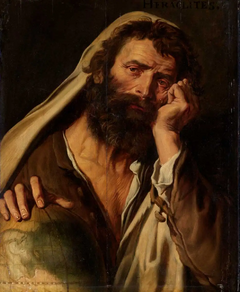More languages
More actions
Heraclitus Ἡράκλειτος | |
|---|---|
 | |
| Born | 6th century BCE Ephesus, Ionia, Achaemenid Empire |
| Died | 5th century BCE Ephesus, Ionia, Delian League |
| School tradition | Ionian |
Heraclitus, also called “the obscure,” was an ancient Greek philosopher who lived in the commercial city of Ephesus in the Western Asian portion of modern day Turkey, and was one of the most eminent dialecticians of antiquity.
According to him, becoming is the fundamental law of the universe; struggle and the interpenetration of opposites, the unity of being and non-being—such is the essence of the world. In this instability of everything, in the continual change of all being, Heraclitus saw the most general law of the universe. Everything flows, nothing is constant. As a result, “We cannot jump into the same river twice.” The universe is strife and peace, summer and winter, flux and rest, surplus and famine, etc. Contradiction, the dominant principle of the world, is, according to Heraclitus, inherent in all things, so that everything is an interpretation of opposites.
Life[edit | edit source]
Heraclitus believed that "for it is death to souls to become water, and death to water to become earth," meaning that he believed a dry soul was best and in accordance with this doctrine when he was affected by dropsy he attempted to remove the water from his body to cure himself. His method for this was to cover himself in dung in hopes of drawing the water out of his body, this lead to his death.[1]
